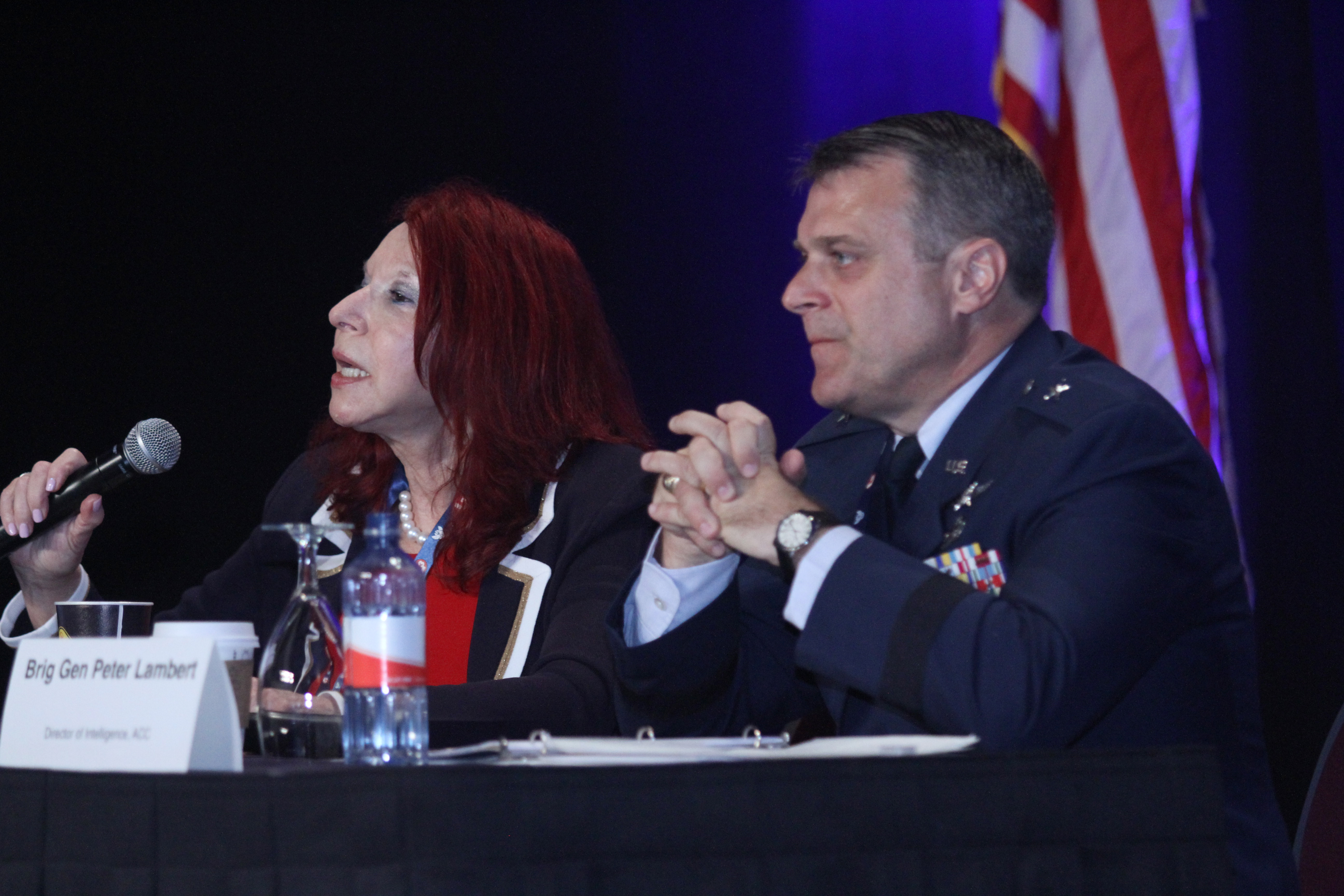Lani Kass (left), CACI’s senior vice president and corporate strategic advisor, and Brig. Gen. Pete Lambert (right), Air Combat Command's director of intelligence, speak at AFA's Air Warfare Syposium in Orlando, Fla., on March 2, 2017. Photo by Dan Higgins.
Russians are testing fusion capabilities in Syria much like Americans experimented with technology during Desert Storm, but they’re “absolutely not” where USAF is with regard to C2 and fusion warfare, said Brig. Gen. Peter Lambert, Air Combat Command’s director of intelligence.
Speaking at AWS17, Lambert cited three other information challenges, including ISIS, Russia, and “the Pacific.” Harvesting and understanding data is one way to counter ISIS’s “very adept” utilization of social media, for one. Lambert also said big data manipulation and analysis could’ve predicted the Russian move into Crimea. And, in the Pacific, the information domain is a “contested domain.”
How exactly USAF will use data and in what environment is one of Lambert’s priorities.
“We have made significant progress since 2015,” Lambert said, referencing that year’s Mitchell Institute for Aerospace Studies white paper: An ISR Perspective on Fusion Warfare.
According to Lambert, USAF is currently at the “inflection point” in achieving the C2 and fusion needs of an Air Force facing an increasingly data-centric battlefield, as outlined in the white paper.
“The volume of data we collect today is far greater than anyone can actually analyze,” said Chief of Staff Gen. David Goldfein during his State of the Air Force address on Thursday. “How do we create a common operating picture and present it in way that leaders can then act and make decisions?”
Lambert said Air Combat Command is making progress in this area “faster than anticipated,” listing open architecture, software, and open source intelligence as the main tenets of said progress.
To cope with these developments, ACC is hiring what it’s calling “chief data officers,” a pilot program aimed at working with what Lambert called “the data problem.”
“We’re awash in data,” he said, and it’s impeding airmen from focusing on “things that are important to them.”
The human component of information warfare is more than an impediment, however. It’s also dangerous, said Lani Kass, CACI’s senior vice president and corporate strategic advisor.
“It is ultimately the young operator who has to act upon this data,” she said at the symposium. “The technology enables what remains a contest between human brains.” Citing the pilot’s “speed is life” mantra and the political “information is power” mantra, Kass emphasized the significance of fusion: “If you can indeed fuse speed and information, you do have a winning combination, because you truly combine life and power.”
Still, Kass said she doubted information could ever “completely lift the fog of war.”
“All the information on the planet won’t make war fully open to anticipation,” she said. One of the reasons for this is what Kass called “deliberately deceptive data.”
“The only thing worse than being a victim of deception is not knowing you just fell victim, and sharing deceptive data,” she said, adding “at the speed in which we operate, it is almost humanly impossible to sort the wheat from the chaff.”
So on top of sifting through data to find worthy information, analysts must also be weary of, and keep an eye out for, information that was intentionally injected into their feeds by the enemy,
In order to help airmen do so, Lambert said ACC is seeking stronger machine-to-machine technologies and communications, or what he called the “holy grail.” Lambert said ACC is “pursuing” such capabilities, but added that the acquisitions process is still a work-in-progress.
“We’re really going 180 degrees from where we’ve gone the previous decade and a half,” Lambert said, adding the past wasn’t a “bad” direction, just different. The “leapfrogging” Lambert is seeking in his quest is what is driving the acquisitions process.
“We talk about [the] acquisitions system and its ability to adapt to the speed at which Silicon Valley operates everyday,” Kass said. “It’s almost pitiful to see—and I’ve seen it firsthand when I was on the Air Staff—how slow and ponderous the acquisitions system is.”
In response to Lambert’s claim the Russians are behind the Americans in the information arms race, Kass said she tends “not to underestimate the adversary.”
“What we see in Syria is what Russian wants us to see. Do not assume that’s all they got,” Kass said. “They are a nation of mathematicians, chess players, and engineers.”
And China, she added, is the same.
